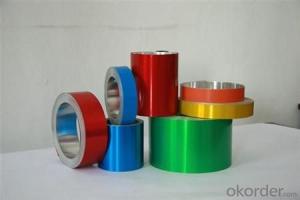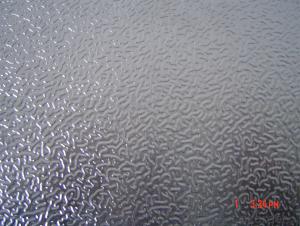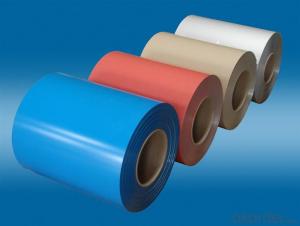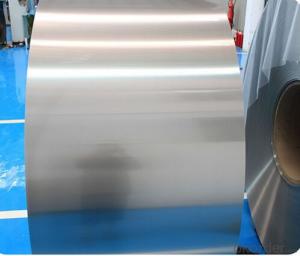Aluminium Pre-painted PVDF Hot Demanded Coil
- Loading Port:
- Shanghai
- Payment Terms:
- TT OR LC
- Min Order Qty:
- 8 m.t.
- Supply Capability:
- 2000 m.t./month
OKorder Service Pledge
OKorder Financial Service
You Might Also Like
Item specifice
Structure of Aluminium Pre-painted PVDF Hot Demanded Coil Description:
Coated aluminum coil/sheet are of a wide range of colors, which gives wonderful appearance no matter in residential and commercial constructions of great exhibition centers.
The coated aluminum coil/sheet have been widely used in the fields of construction and decoration( garage doors, ceiling etc.), electronic appliances, lighting decoration, air-condition air pipes, sandwich panels and drainages etc.
Main Features of the Aluminium Pre-painted PVDF Hot Demanded Coil:
1) High flexibility
2) Impact resistance
3) Excellent weather-proof durability
4) Anti-ultraviolet
5) High erosion resist
Images of the Aluminium Pre-painted PVDF Hot Demanded Coil:
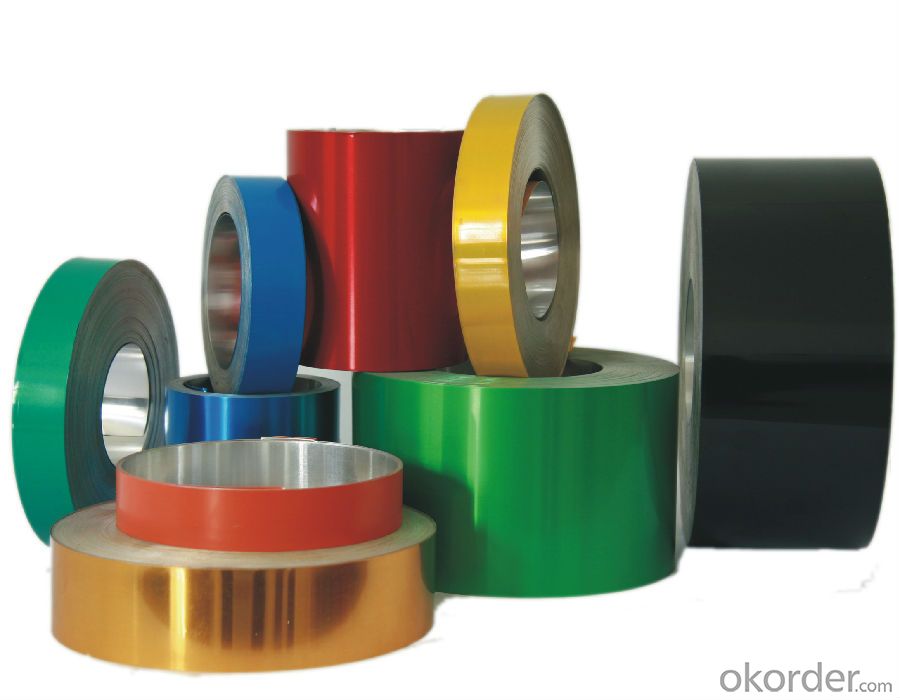
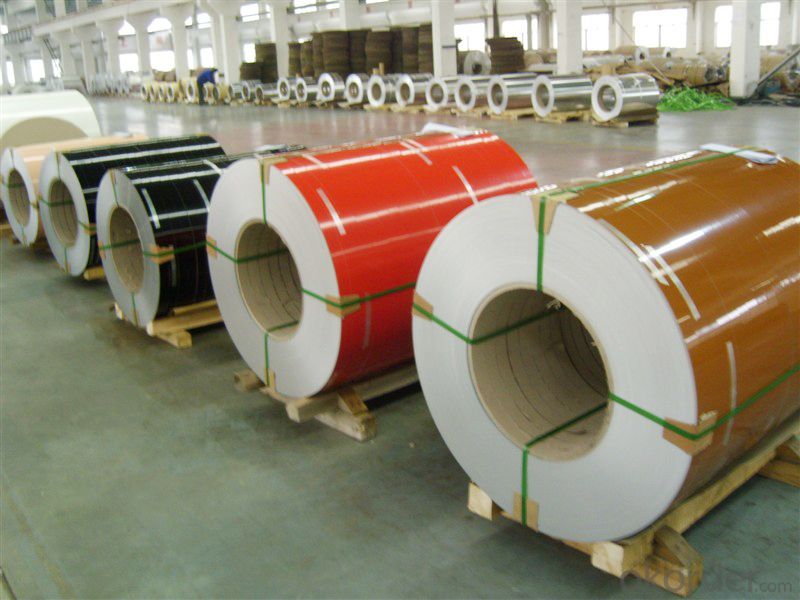
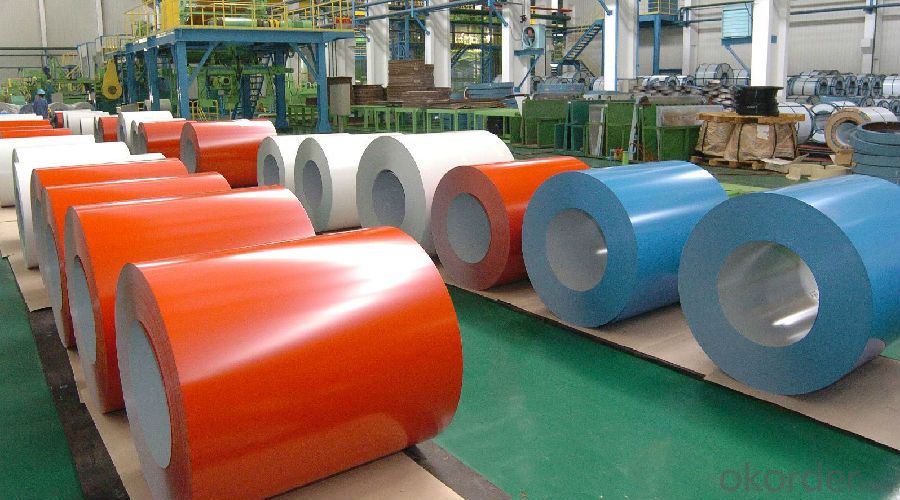
Aluminium Pre-painted PVDF Hot Demanded Coil Specification:
Alloy | A1100,A3003,A1050,A8011 etc |
Temper | H16,H18,H24 |
Thickness | From 0.024mm to 1.2mm |
Width | Standard width:1240mm |
Special width:1300mm,1520mm,1570mm,1595mm | |
Diameter | Standard dia:1200mm |
Interior dia:150mm,405mm,505mm | |
Weight | 2.5 T/coil,3.0 T/coil |
Coating | PE, PVDF, AC |
Surface | Embossed, mill finish, coated |
Color | AS to code RAL |
Gloss | 10-90%(EN ISO-2813:1994) |
Coating Thickness | PE: more than 18 micron |
PVDF: more than 25 micron | |
Coating Hardness (pencil resistance) | More than 2h |
Coating adhesion | 5J(EN ISO-2409:1994) |
Impact Resistance | No peeling or cracking(50 kg/cm,ASTMD-2794:1993) |
Flexibility (T-bend) | 2T |
MEK resistance | More than 100 |
FAQ Aluminium Pre-painted PVDF Hot Demanded Coil:
a.What is monthly capacity
---CNBM is one stated own company and our monthly capacity is about 2000tons.
b. Now which countries do you export your goods?
---Now we export to South East Asia,Africa, North America,South America ect.
- Q:Can aluminum coils be used in automotive applications?
- Automotive applications can indeed utilize aluminum coils. Given their lightweight nature, aluminum coils prove to be an exceptional option for automotive manufacturers, aiding in the reduction of overall vehicle weight. Consequently, this reduction can lead to enhanced fuel efficiency and performance. In addition, the outstanding heat conductivity of aluminum coils becomes indispensable in automotive applications, particularly when it comes to heat dissipation. Furthermore, the commendable corrosion resistance of aluminum coils proves to be highly advantageous in automotive applications, specifically when vehicles are exposed to diverse weather conditions and road salts. All in all, the utilization of aluminum coils in automotive applications offers numerous benefits, including weight reduction, improved fuel efficiency, superior heat dissipation, and enhanced corrosion resistance.
- Q:How do aluminum coils resist corrosion?
- Aluminum coils resist corrosion due to the natural oxide layer that forms on their surface. This oxide layer acts as a protective barrier, preventing further interaction of aluminum with the surrounding environment and thus inhibiting the corrosion process.
- Q:Can aluminum coils be used in power generation facilities?
- Yes, aluminum coils can be used in power generation facilities. Aluminum is a highly conductive material that offers several advantages for power generation applications. It has excellent thermal conductivity, meaning it can efficiently transfer heat away from the coils, which is crucial for cooling systems in power generation facilities. Additionally, aluminum is lightweight, making it easier to handle and install compared to other metals like copper. This lightweight property also reduces the overall weight of the equipment, resulting in cost savings. Furthermore, aluminum is corrosion-resistant, which is important for power generation facilities that often operate in harsh environments. Overall, aluminum coils are a viable option for power generation facilities due to their conductivity, thermal efficiency, lightweight nature, and corrosion resistance.
- Q:I have heard that aluminum may be a contributing agent in causing Alzheimer's disease, and that if we drink from aluminum cans, that we get aluminum into our system from them. It seems like this would be pretty easy to test in a laboratory, whether or not there are aluminum particles in the contained beverage. But I have heard or read that the inside of the cans are coated with something. So is this just typical uninformed rumors from the Internets, or is there anything to it? Hate to sound rude, but I am not really interested in opinions, like Well I don't think they would sell them if... or Oh yes, I think you get lots of aluminum from it. I am only interested in facts, not gut feelings or opinions.
- I recently covered this in a materials science class I am taking. My professor is Dr. Han Choo. Most aluminum cans have a coating of epichorohydrin. This is not to keep out the aluminum from the drink, but rather it is meant to keep the drink from reacting with the can(many sodas can actually eat through metal). The reaction of the soda with the can ruins the taste which is obviously something soda companies do not want. Aluminum also does not cause Alzheimer's. The metal is considered poisonous in large quantities and the FDA restricts the amount that can be added to drugs, food, drink, etc., but scientific consensus states that there is no link between Alzheimer's disease and aluminum. As far as BPA(Bisphenol A) health concerns go, there is little evidence proving any real harm to adults. The problems are only seen in offspring of the rodents being tested with BPA. For the most part there is little concern about the negative results of BPA exposure. There has not been any clear links in humans yet either. Extensive testing is still being done and BPA might be marginally dangerous to infants, but I wouldn't worry about it too much. If you still wish to guard yourself against BPA you should be aware that BPA is used in almost all commercial plastics and can liners(bottles, canned food, food storage containers, etc.) not just in aluminum cans.
- Q:Can aluminum coils be formed or shaped?
- Certainly, aluminum coils have the capability to undergo formation and shaping. Aluminum, being an extremely pliable metal, can effortlessly be molded or bent into diverse configurations without experiencing any fractures or breaks. Aluminum coils frequently find usage in numerous applications including the production of heat exchangers, condenser coils, evaporator coils, and air conditioning systems. These coils can be transformed into various structures such as flat sheets, tubes, or finned coils, catering to the specific demands of the intended purpose. The adaptability and formability of aluminum coils render them exceptionally versatile and extensively employed across multiple industries.
- Q:How are aluminum coils processed for specific surface coatings?
- Aluminum coils are processed for specific surface coatings through a series of steps that involve cleaning, pre-treatment, application of the coating, and curing. Firstly, the aluminum coils are thoroughly cleaned to remove any dirt, grease, or other contaminants that may hinder the adhesion of the coating. This is usually done through a combination of chemical cleaning agents, rinsing, and sometimes mechanical methods. After cleaning, the coils undergo a pre-treatment process. This step prepares the surface of the aluminum for optimal adhesion of the coating. Depending on the specific coating requirements, the pre-treatment can involve chemical etching, conversion coating, or both. Chemical etching creates a rough surface that enhances the bond between the aluminum and the coating, while conversion coating forms a thin layer that improves corrosion resistance and adhesion. Once the pre-treatment is complete, the specific surface coating is applied onto the aluminum coils. This can be done through various methods such as coil coating, spray coating, or electrostatic coating. Coil coating is a common technique where the coil is continuously fed through a coating line where the coating material is applied evenly and precisely onto the surface. After the coating is applied, the aluminum coils are cured to ensure the coating properly adheres and hardens. Curing can be done through heat, where the coated coils are passed through an oven or furnace at a specific temperature and time to promote cross-linking and curing of the coating material. Alternatively, some coatings may require UV curing, where the coated coils are exposed to ultraviolet light to achieve the desired curing process. Overall, the process of processing aluminum coils for specific surface coatings involves cleaning, pre-treatment, coating application, and curing. This ensures that the coils are properly prepared and coated to meet the desired surface properties and performance requirements.
- Q:Are aluminum coils resistant to UV radiation?
- Yes, aluminum coils are generally resistant to UV radiation. Aluminum is a highly durable and corrosion-resistant material, and it has natural properties that make it resistant to the damaging effects of UV radiation. Unlike certain other metals, aluminum does not oxidize or deteriorate when exposed to sunlight for extended periods of time. This makes it an ideal choice for applications where UV exposure is a concern, such as outdoor structures, solar panels, and automotive components. However, it is important to note that while aluminum is resistant to UV radiation, it can still be subject to other forms of degradation if not properly protected or maintained.
- Q:Can aluminum coils be used in the production of electronic devices?
- Aluminum coils have the capability to be utilized in the manufacturing of electronic devices. Within diverse industries, including electronics, aluminum is a versatile and extensively employed material. It possesses exceptional electrical and thermal conductivity, rendering it appropriate for implementation in electronic components such as coils and inductors. In the realm of electronic devices necessitating the transmission of electrical energy, aluminum coils are frequently employed in power transformers, motors, generators, and other tools. Moreover, aluminum is an appealing option for manufacturers due to its lightweight nature, durability, and cost-effectiveness. Nevertheless, it is crucial to acknowledge that the appropriateness of aluminum coils will ultimately depend on the specific application and requirements of the electronic device.
- Q:What are the common surface treatments for aluminum coils in the automotive industry?
- Some common surface treatments for aluminum coils in the automotive industry include anodizing, painting, and powder coating.
- Q:What are the different coil handling options available for aluminum coils?
- Aluminum coils have several options for handling, depending on the user's preferences and specific requirements. Some commonly used options include: 1. Coil Cradles: These are horizontal racks or frames that provide support and stability for aluminum coils during storage or transportation. They come in various sizes and designs to accommodate different coil dimensions. 2. Coil Cars: These mobile platforms have lifting mechanisms to easily move aluminum coils between different processing stations. They can be manually operated or automated, depending on the desired level of automation. 3. Coil Turnstiles: These rotating devices hold multiple coils vertically, allowing for easy access to individual coils without heavy lifting or rearranging. They are ideal for high-volume production environments that require quick coil changeovers. 4. Coil Upenders: Specialized equipment used to rotate or flip aluminum coils to change their orientation. They are useful for loading or unloading coils in a vertical position or for specific processes that require a particular coil orientation. 5. Coil Lifters: Specifically designed lifting devices for aluminum coils. They have adjustable arms or clamps to securely grip the coil for safe and efficient lifting. Available in manual, semi-automatic, and fully automated models. 6. Coil Tippers: Used to tilt or incline aluminum coils for various purposes such as coil feeding or inspection. They can be operated manually or powered by hydraulic or pneumatic systems. 7. Coil Stackers: Used to neatly stack and store aluminum coils vertically. They have adjustable arms or forks to accommodate different coil sizes, optimizing storage space and ensuring easy access when needed. These examples showcase the variety of coil handling options available for aluminum coils. Each option has its own advantages and suitability for different applications or industries. Careful consideration of specific requirements and constraints is essential when selecting the most appropriate coil handling solution.
1. Manufacturer Overview |
|
|---|---|
| Location | |
| Year Established | |
| Annual Output Value | |
| Main Markets | |
| Company Certifications | |
2. Manufacturer Certificates |
|
|---|---|
| a) Certification Name | |
| Range | |
| Reference | |
| Validity Period | |
3. Manufacturer Capability |
|
|---|---|
| a)Trade Capacity | |
| Nearest Port | |
| Export Percentage | |
| No.of Employees in Trade Department | |
| Language Spoken: | |
| b)Factory Information | |
| Factory Size: | |
| No. of Production Lines | |
| Contract Manufacturing | |
| Product Price Range | |
Send your message to us
Aluminium Pre-painted PVDF Hot Demanded Coil
- Loading Port:
- Shanghai
- Payment Terms:
- TT OR LC
- Min Order Qty:
- 8 m.t.
- Supply Capability:
- 2000 m.t./month
OKorder Service Pledge
OKorder Financial Service
Similar products
New products
Hot products
Hot Searches
Related keywords
